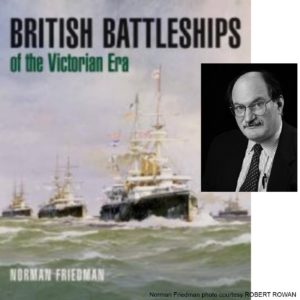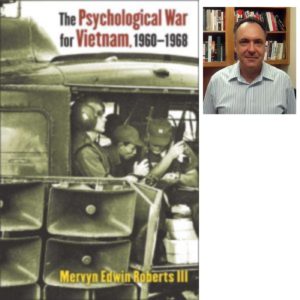I’ve added the wars of the 13th and 14th centuries to my timeline.
Author: WarScholar
19th C Warfare book – “British Battleships of the Victorian Era” (Naval Institute Press, 2018) – Norman Friedman interview
Podcast: Play in new window | Download
Subscribe: RSS
 Norman Friedman is a physicist and historian who has written extensively on naval matters especially the US and UK navies. I interviewed him about his latest book.
Norman Friedman is a physicist and historian who has written extensively on naval matters especially the US and UK navies. I interviewed him about his latest book.
1:27- Mr. Friedman has been interested and writing about navies for some time. He’s written about 40 books, 30 of them in history.
3:29 – He had written on later battleships and became interested in the ships that came before the world wars. One of the themes in technological surprise.
5:14 – The French tried to beat the British with technological change but the British simply didn’t want to spend money. Steam propulsion is an early technological race between the French and British.
7:29 – For much of this period, British statesman didn’t believe war would happen. But the Franco-Prussian war shocks them. In 1877, the British think they have to fight the Russians when Russia goes to war with Turkey.
9:14 – The British find they can’t man the fleet properly and that their intelligence service is weak. But they still scare the Russians by sailing into the Black Sea in a storm. But the British are unable to keep a fleet in the Baltic Sea.
12:32 – The British financial sector had great sway over British politics. Their influence affected the British Navy. They wanted parts of China, Argentina and the United States protected by the British Navy for trade reasons.
16:44 – Underwater weapons have a great effect on worldwide naval strategy in this period. They’re cheap weapons that can destroy expensive ships. In 1885, people begin to wonder if the sea can be controlled by anyone. These weapons help fleets escape from their own ports easier and it’s harder for big fleets to control smaller fleets. The British try to tabulate information and learn their fleet isn’t big enough for sea control.
19:29 – Steel comes in between 1870 and 1880. The French build new ships in 1875. Sails disappeared in the 1880s.
21:36 – British engineers say that sails should be discarded but many people fear that coal won’t be available in sufficient quantities abroad at coaling stations to get rid of sails.
23:15 – The British made their own steel. But the French made better steel at the time. Most countries bought British steel for armor and guns. Krupp in Germany made excellent steel and excellent guns.
26:14 – He extensively used documents from the British Archives. The National Maritime Museum has ship covers.
31:04 – In 1882, the US formed a naval intelligence organization that wrote about information from abroad and that included UK material.
33:44 – reading technology books contemporary to that period was helpful.
35:08 – The French held a World’s Fair where naval capabilities were one thing showcased.
37:43 – He was most surprised about the effect of underwater weapons on how worried naval thinkers were about them. He also didn’t feel he fully understood the development of heavy guns and on the effects of exports. He’d like to know who was buying British heavy guns and why.
48:31 – His works can be found on Amazon and Seaforth publishes his books in the UK.
49:32 – The Victorian period is an interesting time that a lot of people have forgotten. There are a lot of parallels between that period and now. It also tells us about where the modern world came from.
For more “Military History Inside Out” please follow me on Facebook at warscholar, on twitter at Warscholar, on youtube at warscholar1945 and on Instagram @crisalvarezswarscholar
Guests: Norman Friedman
Host: Cris Alvarez
Tags: military, history, military history, conflict, war, interview, non-fiction book, victorian era, UK, Germany, Russia, France, steel, armored hulls, steam, coaling stations, coal, Franco-Prussian war – Russo-Turkish war, trade
Vietnam War history book – “The Psychological War for Vietnam” (University Press of Kansas, 2018) – Merv Roberts interview
Podcast: Play in new window | Download
Subscribe: RSS

Dr. Merv Roberts has worked on psychological operations in Afghanistan. His work there inspired him to write a history of psychological operations in the Vietnam War and I interviewed him about this book “The Psychological War for Vietnam, 1960-1968.”
2:07- Dr. Roberts decided on studying Information Operations in Vietnam after he returned from a deployment to Afghanistan. No one had done an over arching study of Psychological Operations in the Vietnam War.
3:38 – The book is on joint operations and looked at both North and South Vietnam. He used the Foreign Broadcast Information Service collections.
5:25 – The North Vietnam program was modeled on the Soviet program. It’s about agitation and propaganda. The American system evolved over the course of the war. It came from the American advertising culture that used subjective truth.
8:38 – North Vietnamese leadership was divided over whether to focus on the North or to spread the revolution to the South. The US started trying to divide these factions in 1967 but then [we] the US ends psy war against the North after the Tet Offensive.
12:14 – The North became ineffective at waging psychological warfare against the South but was very effective in it’s worldwide campaign to get countries against the war.
17:11 – Dr. Roberts compares psychological operations and civil affairs activities. In Vietnam civil affairs fell under psychological operations.
21:31 – Edward Landsdale was good at psychological operations in the region.
23:55 – The North Vietnamese used some anti-war activists to spread their message.
27:03 – FBIS is a largely untapped resource for information on the Cold War and events during this period. He also wants to use Geographic Information Systems in conjunction with FBIS information. He also used the Hamlet level evaluations which he admits many people consider a subjective assessment of villages. There were also terrorist activity reports with geographic data attached. The Friendly Forces file provides data on where friendly forces were during the war.
34:04 – Most Psy Ops guys aren’t trained very well during Vietnam.
35:35 – Going through all the captured documents was fascinating for Dr. Roberts. Much of them haven’t been looked at more than once since capture.
37:03 – There are indications the program was effective in 1968.
39:08 – The Vietnamese go to Texas Tech when they want to research the Vietnam War because of how many documents Tech has from the war. FBIS is harder to get a hold of.
42:25 – There are very few books looking at psychological operations across various wars so this book will help fill that gap.
47:34 – There were problems between various US government organizations on how to do psy op in Vietnam. The State Department had the primacy on what messaging would be done in Vietnam.
For more “Military History Inside Out” please follow me on Facebook at warscholar, on twitter at Warscholar, on youtube at warscholar1945 and on Instagram @crisalvarezswarscholar
Guests: Merv Roberts
Host: Cris Alvarez
Tags: vietnam war, psychological operations, north vietnam, tet offensive, hamlet program
